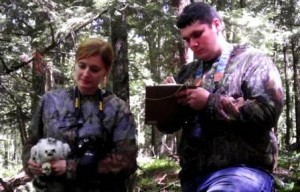
DUBOIS – Three graduates from the Penn State DuBois Wildlife Technology Program recently accompanied one of their former faculty members to Wisconsin for a rare opportunity to study birds of prey.
Senior Instructor in Wildlife Technology Keely Roen organized the trip and was joined by graduates Toby Neal, Doug Urmann and April Sperfslage. Neal is currently re-enrolled in Ag Extension and Education; Urmann and Sperfslage are enrolled in Wildlife and Fisheries Science.
The group traveled to Stevens Point, WI, to attend the five-day, hands-on workshop, Introduction to Raptor Field Techniques, at the Linwood Springs Research Station. The workshop is presented by Gene Jacobs, a renowned specialist on birds of prey who provides consulting services on raptors throughout the country.
He has 38 years of experience studying the birds, and has written or coauthored a dozen articles on raptors that have been published in peer reviewed journals. Linwood Springs is a privately funded research station that conducts studies on migration routes, mortality rates, nesting, and other behaviors of raptors.
The workshop, held each year in June, attracts researchers, educators, and students from all over the world. It focuses on teaching students the field techniques used to study raptors during their breeding season.
With hands-on lessons in the field, the Penn State Students participated in actual ongoing research projects at Linwood Springs. They caught and banded red-shouldered hawks, kestrels, merlins, and goshawks, conducting studies on the birds along the way. For an educator such as Roen, it was an opportunity to learn the best practices in teaching all topics related to raptor research.
“Wisconsin is known for its raptor research, but the workshop really exceeded my expectations,” Roen said. “We were fortunate to be a part of some of the exciting research going on at Linwood Springs Research Station; the staff allowed us to participate in every part of the process.”
“The experience was absolutely amazing,” said Neal. “I loved being able to lend a hand in the research and data collection. I look forward to keeping in contact with the hosts of the workshop and learning more about their findings. I wish we could have had more time, because we had so much more to learn.”
During the process of catching and banding the birds, students learned the proper methods for bird capture and handling, including the use of nets and video surveillance.
They also learned research techniques for studying the birds, such as how to safely and humanely draw blood samples, how to conduct populations surveys, and more. It gave the students a chance to build upon their existing education by increasing the knowledge and skills that they’ll use to study wildlife in the field during their future careers.
“The trip was a blast. We used techniques we learned from school, and expanded on top of those we learned,” said Urmann. “Capturing and handling live raptors is an experience that I will never forget. The hands on experience will help me prepare for future jobs, giving me the much needed experience in working with raptors, and as a group on projects.”
For student April Sperfslage, the experience helped to affirm her calling. She said, “Raptors are of particular interest to me, and this workshop has helped me to realize that working with birds of prey is exactly the career path that I would like to follow. I believe that there is no other career that could take me as far or make me as happy in life. To me, nature is almost magical and can give you that special feeling that many other things cannot give you. This is definitely the field for me.”
This opportunity for Roen and the students to participate in the workshop was funded by the Penn State College of Agriculture and the Penn State DuBois Undergraduate Professional Development Fund. Roen attests that it was a good investment, as the impact this endeavor will have on her program reaches far beyond the scope of a single workshop.
“I made contact with several Wisconsin professionals and got some excellent ideas for activities I plan to bring into my fall and spring classes,” Roen said. “Gene and I also discussed developing a summer workshop tailored to the needs of our Penn State DuBois students. Perhaps it could be an annual trip for students in our program who are particularly interested in raptor research. I am really grateful that the College of Agriculture and Penn State DuBois were so supportive of our travel.”


